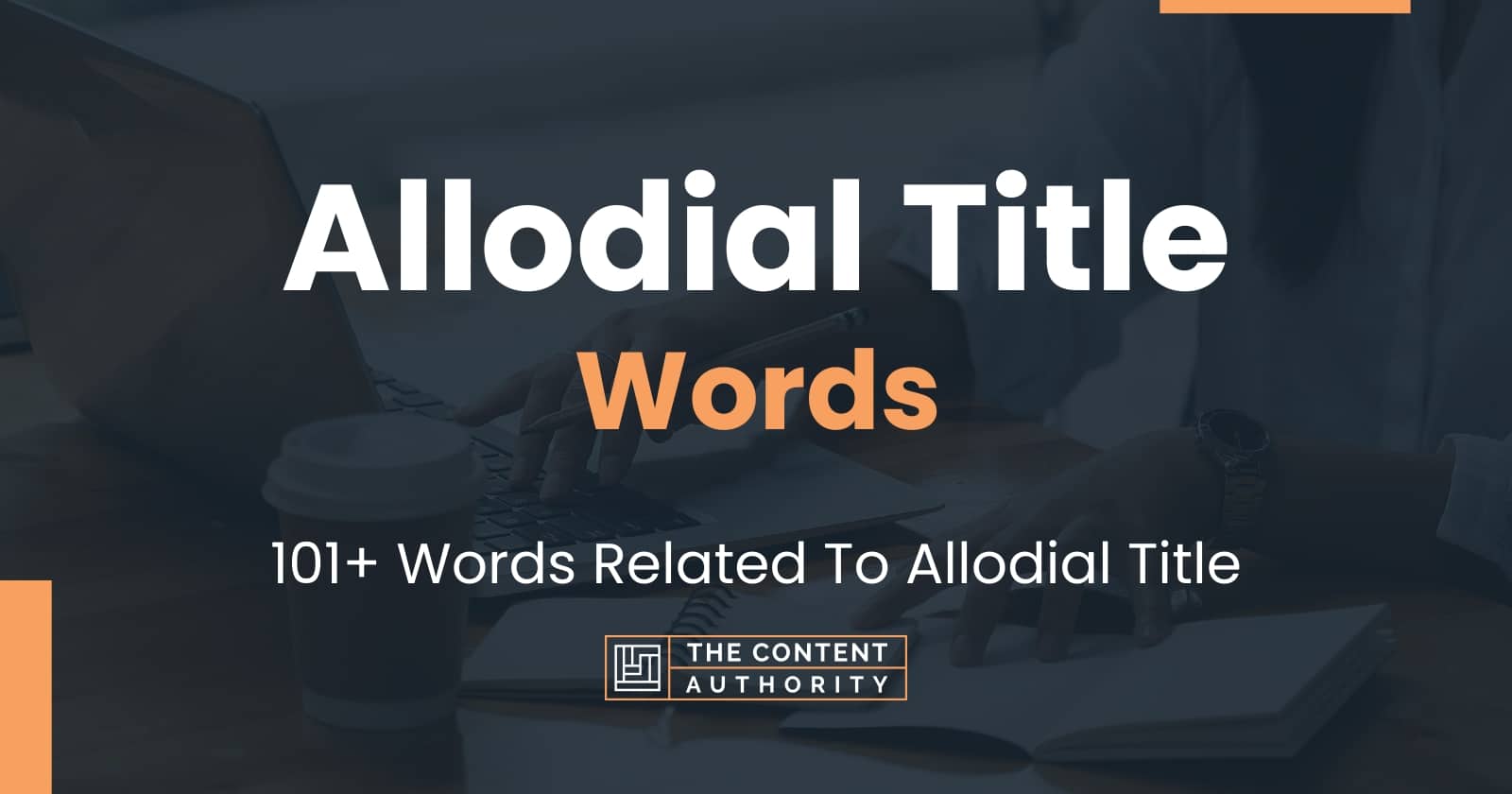Do you ever wonder about the true nature of land ownership? While we often assume it’s straightforward, the concept of “allodial title” presents a different perspective. Allodial title represents the pinnacle of ownership – owning land free and clear, without government intervention. This starkly contrasts with how most land is owned, prompting us to explore allodial title’s meaning, history, implications, and potential relevance for landowners.
What is Allodial Title?
Defining Allodial Title
Allodial title embodies the concept of complete, unrestricted land ownership, free from any superior claim, even from the government. Imagine having ultimate control, without any landlord – not even the government – dictating what you can do on your property. This differs significantly from the more common fee simple ownership, where the government retains ultimate authority. With fee simple, you own the property, but subject to government regulations and taxation. Allodial title, theoretically, eliminates these limitations, placing you at the top of the ownership pyramid.
Historically, allodial title traces back to ancient Germanic law, representing a departure from feudal systems where land ownership was essentially conditional, tied to service to a lord. The term “in allodium” historically referred to land acquired through occupancy and defended against others. Today, while theoretically pure, true allodial title is exceedingly rare.
Allodial Title vs. Fee Simple
The vast majority of property is held under fee simple, signifying ownership subject to government rules, regulations, and taxes. Fee simple grants numerous rights, but with inherent limitations. Allodial title, conversely, represents near-complete autonomy, theoretically minimizing government influence. This naturally raises the question: why isn’t allodial title more common?
Acquiring Allodial Title: A Complex Undertaking
Acquiring allodial title is rarely easy. One potential path involves obtaining a land patent – a government document verifying original land ownership. This arduous process often demands significant time, resources, and a degree of luck.
Navigating the Land Patent Process:
- Establishing Current Ownership: Demonstrating existing land ownership, usually through a deed or inheritance records.
- Meeting BLM Standards: Ensuring the land description adheres to Bureau of Land Management (BLM) standards, often requiring professional surveying.
- Retrieving the Original Patent: Obtaining the original land patent from the BLM, a potentially lengthy and bureaucratic process.
- Declaration of Acceptance: Formally accepting the terms and responsibilities of allodial ownership through a Declaration of Acceptance.
- Public Notification: Publicly posting certified copies of all documents to establish the change in ownership.
Weighing the Pros and Cons of Allodial Title
Pursuing allodial title requires careful consideration of its potential benefits and drawbacks.
Potential Advantages:
- Unrivaled Control: Allodial title arguably grants the highest degree of control over your land, minimizing external restrictions.
- Possible Tax Benefits: Some believe allodial title may offer tax advantages. This remains a subject of debate and requires consultation with a tax professional. It might reduce or eliminate property taxes, depending on local interpretations. Furthermore, inheriting allodial property could simplify the inheritance process, potentially avoiding probate and minimizing inheritance taxes.
Potential Challenges:
- Acquisition Hurdles: The process is complex, demanding, and not guaranteed.
- Legal Uncertainties: The legal landscape surrounding allodial title is complex and might present unforeseen challenges.
- Limited Recognition: Allodial title’s recognition and understanding varies across jurisdictions, potentially leading to complications.
Taxes, Jurisdictional Variations, and the Future of Allodial Title
The tax implications of allodial title are often a key consideration. While potential advantages exist, the specifics depend on individual circumstances and local laws. Consulting a tax expert is essential. The legal standing and implications of allodial title also vary significantly across jurisdictions.
Growing interest in property rights and alternative governance models raises questions about allodial title’s future. While its widespread adoption remains uncertain, some experts suggest increasing interest in alternative ownership models like allodial title. Other experts, however, remain skeptical about its long-term feasibility given current legal frameworks. Ongoing research and discussion will likely shape the future understanding and implementation of allodial title.
| Feature | Allodial Title | Fee Simple |
|---|---|---|
| Ownership | Absolute | Conditional (subject to government) |
| Government Control | Minimal (theoretically) | Substantial |
| Acquisition | Complex, uncommon | Common |
| Tax Implications | Potential advantages (consult expert) | Standard property taxes typically apply |
| Inheritance | Potentially avoids probate | Subject to probate |
This exploration of allodial title provides a foundational understanding. Consulting with legal and financial professionals is always recommended for tailored advice.
Can You Get an Allodial Title in the US?
The idea of absolute land ownership, free from any constraints, is a compelling one. However, the reality of allodial title in the United States is far more nuanced. This section delves into why this form of ownership is so rare in the US.
Allodial title represents the theoretical pinnacle of land ownership—complete autonomy, free from taxes, regulations, and government interference. It’s a concept with historical roots, predating modern governments’ influence over land.
However, this ideal clashes with the reality of the US legal system. The power of eminent domain—the government’s right to take private property for public use (with just compensation)—fundamentally contradicts the concept of absolute ownership. Even if you possessed allodial title, the government could still acquire your land for public use. This single power effectively renders pure allodial title unattainable in the US.
The closest approximation to allodial title in the US is fee simple ownership. Fee simple grants extensive rights—building, farming, selling, bequeathing—but within the boundaries of the law. This includes property taxes, zoning regulations, and building codes. Fee simple offers substantial freedom, but not complete autonomy.
Land patents, often mistakenly associated with allodial title, simply represent the initial transfer of land from the government to a private citizen. They do not negate the government’s inherent powers.
Claims of achieving “allodial title” through complex legal maneuvers should be treated with extreme caution. These schemes often fail to circumvent the government’s inherent authority.
While land ownership principles are generally consistent across the US, state laws may have slight variations, leading to differing interpretations. However, the core principle remains: true allodial title, in its purest form, is not achievable within the US legal system.
Therefore, the realistic answer to “Can you get an allodial title in the US?” is no. While the concept is intriguing, focusing on maximizing the rights offered by fee simple ownership is more practical.
What are the Benefits of an Allodial Title?
Allodial title, representing the most complete form of land ownership, offers several theoretical benefits:
- Unparalleled Control and Autonomy: Act as the ultimate decision-maker concerning your land, free from typical government restrictions.
- Potential Protection from Government Liens: Shield your land from seizure or liens for unpaid debts.
- Possible Tax Advantages: May offer potential relief from property taxes, depending on local interpretation and implementation. It may also simplify inheritance by potentially avoiding probate and minimizing inheritance taxes, facilitating generational wealth security.
- Enhanced Security against Eminent Domain: While not absolute protection, allodial title may offer greater resistance to government seizure through eminent domain.
However, obtaining allodial title is challenging. It’s uncommon, and the acquisition process varies significantly across jurisdictions, often involving complex legal procedures and potentially requiring specialized legal counsel.
It’s important to temper expectations. Allodial title is not a panacea for all land ownership challenges, and some perceived benefits may be exaggerated. While it might offer tax advantages, it doesn’t guarantee a complete tax haven. Local governments may still levy certain taxes. Allodial title’s legal standing and practical benefits depend heavily on local interpretations and enforcement.
| Feature | Fee Simple | Allodial Title |
|---|---|---|
| Ownership | Conditional, subject to government rights | Absolute, free from government burdens |
| Taxes | Typically required | Potentially reduced or eliminated, but varies |
| Government Liens | Susceptible | Generally protected |
| Inheritance | Subject to probate | Potentially bypasses probate, minimizes taxes |
| Prevalence | Common | Rare |
Concrete examples of pure allodial properties are scarce. The legal landscape differs significantly across jurisdictions, requiring thorough research and expert guidance. The concept itself has evolved over time, and its future remains a subject of ongoing discussion and debate. Consulting a legal professional specializing in property law is highly recommended for personalized advice.
What is an Example of an Allodial Title?
The ideal of allodial title—complete, unrestricted land ownership—is powerful. Imagine owning land free from property taxes, zoning regulations, and the threat of eminent domain. This ideal, rooted in the historical concept of allodium (land held by occupancy and defense), contrasts sharply with the reality of land ownership in the US.
In the US, the prevalent form of ownership is fee simple. While granting numerous rights (building, selling, bequeathing), fee simple remains subject to government authority – property taxes, zoning laws, and eminent domain. The court case Stewart v. Chicago Title Ins. Co. defines allodial title as “one that is free,” but achieving this freedom in the US is extraordinarily difficult. Several reasons why this form of ownership isn’t more prevalent include the government’s power of taxation and eminent domain, which contradict the essence of absolute, untouchable ownership.
Land patents, often linked to allodial title, are simply historical documents granting land ownership. They do not grant immunity from governmental authority.
The allure of allodial title persists because it represents the ultimate autonomy over one’s property. However, navigating land ownership in the US requires understanding the practicalities of fee simple and acknowledging the government’s inherent powers.
True examples of allodial title in the modern US are likely non-existent. Some argue that certain forms of tribal land ownership might resemble allodial title, but these are usually subject to federal regulations. The precise limits of land ownership are constantly debated, with some believing there are valid arguments against taxation even within a fee-simple context. While the ideal of allodial title remains a powerful concept, the reality involves a complex interplay between individual rights and governmental authority. If you are interested in achieving greater control over your land measurements, consider the advanced capabilities and accuracy offered by our AccuCentre technology.












